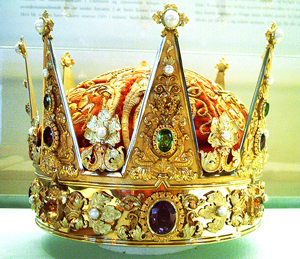
Source: The George F. Landegger Collection of Alabama Photographs in Carol M. Highsmith’s America, Library of Congress, Prints and Photographs Division
Complex inferences involve taking your text evidence and drawing conclusions from it. You make complex inferences by stepping back from the connect-the-dots picture and looking for a bigger picture—one that often involves setting, plot, and subtle characterization.
Sometimes, through the course of the play, you discover the transformation of a character. For example, in My Fair Lady, the play you studied in the previous section, Eliza wants to improve her status by taking speech lessons from the professor. After weeks of hard work, Eliza is ready to attend the embassy ball. As we read a passage from act 4 of the play, Higgins gives a report about the language expert’s impression of Eliza at the ball. Click on evidence in the text below to highlight words that hint at her transformation.


Source: Crown Prince of Norway’s Crown, skibriye, Flickr
From act 1 of the play to this point in act 4, we have seen Eliza transform in ways that she never could have imagined. What are some inferences you can make from this scene where Higgins and Pickering discuss the events of the ball? Remember, a complex inference will not be stated directly and may involve the stage directions and dialogue. Click on any of the inferences below that are possible based on evidence from the text.

Just like characters in a play, we all have hidden capabilities and traits waiting to be discovered. By connecting the dots and searching for hidden clues, you can make discoveries that allow you to infer meaning and get closer to understanding what the playwright intended.